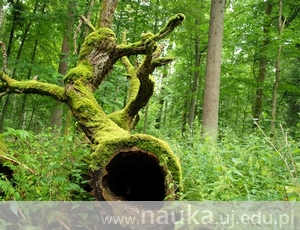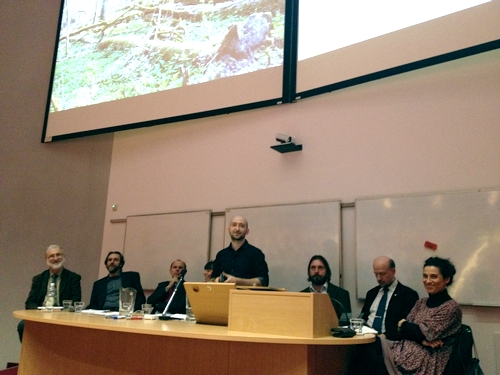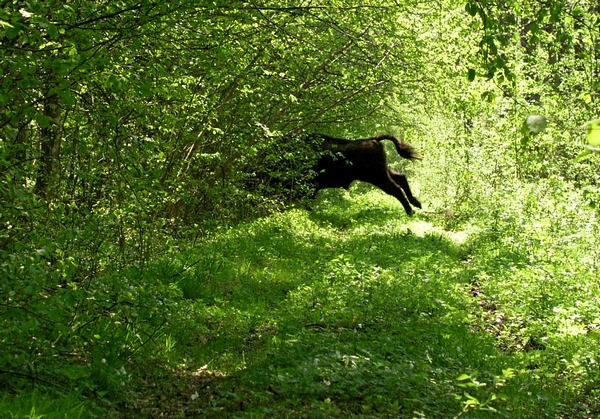
On 15 April 2016, the JU Institute of Environmental Sciences arranged a discussion panel entitled Nature – more than the Białowieża Forest, during which the attendees addressed a challenging issue: to organise and classify our knowledge of the Polish environmental protection, to show its weak points, and to present possible solutions to discovered problems.
The debate featured experts on the subject: Prof. January Weiner (Jagiellonian University), Prof. Jerzy Szwagrzyk (University of Agriculture), Prof. Małgorzata Grodzińska-Jurczak (Jagiellonian University), Prof. Henryk Okarma (Jagiellonian University, Polish Academy of Science), Dr hab. Nuria Selva Fernandez (Polish Academy of Sciences), Dr Adam Siwek (National Heritage Board of Poland), and Adam Wajrak (naturalist, journalist). "Why should we protect nature?" was both the leitmotif and the opening question of the discussion. This is an excellent indicator of the multitude of approaches to environmental protection in Poland.
Questions about nature
 What motivates people who devote their lives to protecting nature? There are many answers to that question. One of the reasons is financial gain from fresh produce, tourism, agricultural and genetic biodiversity, or semi-finished products for agricultural and pharmaceutical businesses. Others are its importance for basic research and its abstract value. "Understanding nature and protecting it has intrinsic value, just like experiencing art or poetry", explained Prof. Weiner. However, these values can be easily negated by some and replaced by economic profits, oftentimes gained by private businesses or corporations instead of the state. In such cases, high-efficiency agriculture and industry is the most rewarding enterprise, which in turn causes large scale technological impact on the environment. Therefore, we have to answer several questions: What value system is espoused by our society? How should we resolve the conflict between the common good (related to a long term perspective) and the good of an individual (frequently based on quick profit)? Do we want to protect the environment, or do we want to subjugate it? What do we protect the environment from?
What motivates people who devote their lives to protecting nature? There are many answers to that question. One of the reasons is financial gain from fresh produce, tourism, agricultural and genetic biodiversity, or semi-finished products for agricultural and pharmaceutical businesses. Others are its importance for basic research and its abstract value. "Understanding nature and protecting it has intrinsic value, just like experiencing art or poetry", explained Prof. Weiner. However, these values can be easily negated by some and replaced by economic profits, oftentimes gained by private businesses or corporations instead of the state. In such cases, high-efficiency agriculture and industry is the most rewarding enterprise, which in turn causes large scale technological impact on the environment. Therefore, we have to answer several questions: What value system is espoused by our society? How should we resolve the conflict between the common good (related to a long term perspective) and the good of an individual (frequently based on quick profit)? Do we want to protect the environment, or do we want to subjugate it? What do we protect the environment from?
Conflicting visions, political interests
In response to those questions, Prof. Szwagrzyk briefly outlined the environmental history of Europe. At first, nature in Europe was wild, resistant, and unsubdued. However, as we started to understand and exploit it, it became more and more reliant on human protection. According to Prof. Szwagrzyk, it was this process which led to birth of many different approaches to environmental protection. For instance, two groups declaring environmental protection as their goal – foresters and non-government organisations – employ not only different, but even conflicting methods in their activities.
Nature is our responsibility, and only the right combination of education and effective legal measures can help us protect it
An important issue was raised by a Dominican friar Antoni Marczewski, present in the audience. He pointed at the disorganisation and fragmentation of Polish ecological movements, very different from the unity of institutions representing foresters and hunters. He also mentioned the political aspect of every discussion about environmental protection: taking any side is immediately treated as a political statement. He stressed that the Catholic church is a staunch supporter of ecology, which is expressed in Pope Francis' latest encyclical Laudato Si.
Is there place for politics in environmental protection? The debated showed that it only serves to exacerbate the conflict. Politics can distort even the most basic of our goals. "It's the authenticity of nature, the wildness of the Białowieża Forest that made it so timeless and valuable – they are the reasons why it was inscribed on the UNESCO World Heritage List", stated Dr Siwek. It is precisely the "wealth of dead trees" – so widely discussed, criticised, and used in political arguments – that is the greatest value of the Białowieża Forest (as it was explicitly mentioned in the UNESCO accession documents). The Forest is one of just 197 such sites in the world.
Law and education
 The Polish legal system does not make it any easier to resolve these conflicts. Prof. Okarma described the system as incoherent, unclear, contradictory, and decentralised. He also mentioned that environmental protection has a very low priority in Poland, since it is governed individually by regional authorities rather than the central government. However, our environment is not a "property" of local governments, it belongs to all of Poland – which is easily observable by the fact that we protect certain areas by naming them "national parks". Lack of centralised environmental protection leads to poor decision making and absence of coordinated approach. This problem is common in European countries; Prof. Fernandez described a very similar issue present in Spain. Prof. Grodzińska-Jurczak stressed that when political conflicts are brought to the regional level, it is more important to manage them than to solve them. Adam Wajrak noted that a good example of this is the Natura 2000 programme, which met with negative reception in every country it was introduced in, and yet is currently the only successful means of protecting the environment. Prof. Grodzińska-Jurczak added that the programme reduces the potential for conflict through various forms of civic participation in environmental protection.
The Polish legal system does not make it any easier to resolve these conflicts. Prof. Okarma described the system as incoherent, unclear, contradictory, and decentralised. He also mentioned that environmental protection has a very low priority in Poland, since it is governed individually by regional authorities rather than the central government. However, our environment is not a "property" of local governments, it belongs to all of Poland – which is easily observable by the fact that we protect certain areas by naming them "national parks". Lack of centralised environmental protection leads to poor decision making and absence of coordinated approach. This problem is common in European countries; Prof. Fernandez described a very similar issue present in Spain. Prof. Grodzińska-Jurczak stressed that when political conflicts are brought to the regional level, it is more important to manage them than to solve them. Adam Wajrak noted that a good example of this is the Natura 2000 programme, which met with negative reception in every country it was introduced in, and yet is currently the only successful means of protecting the environment. Prof. Grodzińska-Jurczak added that the programme reduces the potential for conflict through various forms of civic participation in environmental protection.
So what is the right strategy for environmental protection? What should we do to better understand it, and to facilitate communication between scholars and the society? How to increase the people's trust in science, and to make the voice of researchers heard and respected? The meeting of Kraków's ecologists and environmentalists brought more questions than answers. One is certain: nature is our responsibility, and only the right combination of education and effective legal measures can help us protect it.
Original text: www.nauka.uj.edu.pl





